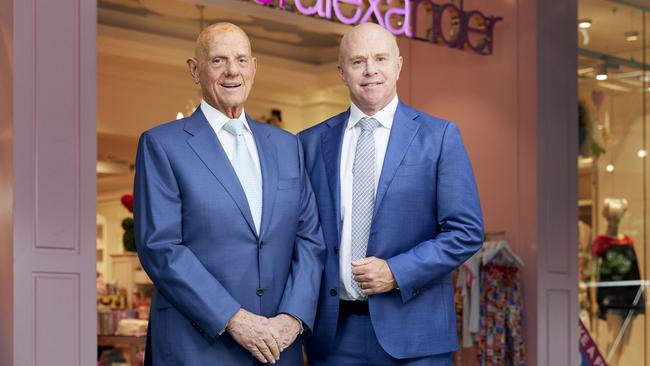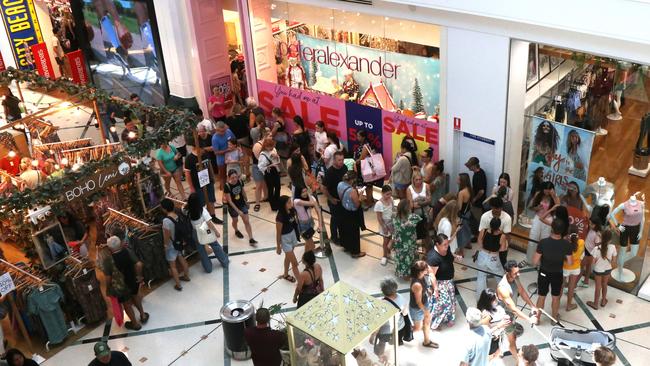
Lew emphasises it's still early days and nothing has been finalised, although intensive work is going on behind the scenes. Even so he has moved forward with more details that could see his Smiggle kids stationery business and his Peter Alexander pyjama and sleepwear business go their own ways from next year. This will involve a split from the head company Premier Investments that will continue to house fashion brands like Just Jeans, Dotti and Portmans.

Lew believes all the growth is ahead of both Smiggle and Peter Alexander, and that growth will be through global expansion.
“There’s an opportunity for the businesses to sort of accelerate the growth,” Lew tells The Australian. And that growth is international expansion.
For those looking across the market, the best comparison would be the Brett Blundy-backed Lovisa, the fast-fashion chain that started from a few stores in Australia to become a multi-billion global retailer with more than 800 stores and a strong footprint in the US.
Without Smiggle and Peter Alexander, the more mature Premier Investments will be managed for its cash brands, a bolstered loyalty program to drive sales, and the access their gives investors to a valuable pool of franking credits – something that would diminish for Premier Investments as Smiggle and Peter Alexander generate more of their income offshore.
There’s also the option that the cashed-up Premier Investments could be used as a bidding vehicle for department store Myer – but that is far down the track. Lew is already sitting on a near 30 per cent stake in Myer and this is expected to gradually increase over time. Lew tells The Australian he supports the recent appointment of Olivia Wirth to head up Myer as executive chair. He points to her work in boosting loyalty as a top Qantas executive that could continue to benefit Myer. Wirth delivered “increadible results” at Qantas, he says. “I feel that the Meyer board made a very good decision”.
Smiggle first
On the current glide path the first business to be spun-off would be the Smiggle with Lew eyeing January next year to pull the trigger.
Although financially smaller than Peter Alexander, Smiggle, known for sells stationery and school supplies to kids, is more advanced in its offshore expansion than any of the Premier brands. And as the only non-apparel brand, a split is an easier proposition. At the current run rate, Smiggle generates more than $312m in sales annually from more than 300 stores, including 100 in the UK and stores across Asia. It is generating low single digit sales growth, after a bumper first half last year, and has plans to grow store numbers by 10 per cent in the near term. The bigger leg to Smiggle’s growth is by becoming a wholesaler as it licenses stores in new markets across the Middle East and Indonesia. This is a “capital light” path to growth and under a new wholesale agreement in Indonesia, Smiggle could expand to 100 stores there in the coming decade. More markets are being explored through the wholesale model.
Peter Alexander, meanwhile, is a bigger business turning over more than $560m annually with high single digit growth. This is the biggest growth option, with sales almost doubling in four years.
The brand will still need to prove itself in a global expansion, and here Lew is exploring a demerger later next year. Peter Alexander is eyeing an entry into the UK market in time for Christmas this year initially with two stores and scaling this up to 10 and the brand will also operate a dedicated UK website.

Lew, ever the retailer, also points out Peter Alexander isn’t just all about pyjamas, with after work leisure wear the new category taking off.
“And it’s fashionable … When I get home, I take my suit off, and I get into my Peter Alexander leisure wear, not into my Peter Alexander pyjamas,” Lew says.
But is the case for Lew’s big split so clear-cut?
There are persistent questions about whether as smaller companies, the two offshoots would enjoy the scale benefits of being part of Lew’s Premier. This includes the potential for higher overhead and back office costs as stand-alone businesses.
And currently as part of the $5bn Premier they have the all the balance sheet backing they to fund their expansion and take risks. As smaller companies, they have less financial runway if global growth slows. However, both brands have proven themselves through the Covid pandemic and through later interest rate hikes.
Finally, there’s the bigger question of what is left behind. Premier will own the mature brands of Just Jeans, Dotti and Portmans as well as holdings in Breville and Myer, as well as the cash and $338m of franking credits. On Tuesday, Premier posted a better-than-expected first half earnings of $210m and delivered a fresh record ordinary dividend of 63 cents a share – even with broader growth in the economy starting to stall.
Very few people have come ahead out betting against Lew: widely recognised as Australia’s most astute retailer who can spot trends well before anyone.
Lew says there’s a view the “parts” of Premier are worth more than the whole, and that’s why the case for a split is becoming hard to ignore.
johnstone@theaustralian.com.au




For billionaire retailer Solomon Lew, the path to getting much bigger is by going smaller. That’s the essence of a plan to pursue a radical three-way split of his $5bn retail empire that turns the convention of big is better on its head.